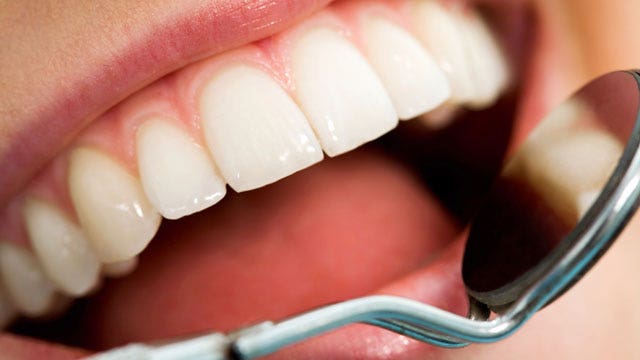5 dental myths debunked
Research shows that your teeth can speak volumes about your overall health, so it’s important to be informed when it comes to taking care of your mouth
Research shows that your teeth can speak volumes about your overall health, so it’s important to be informed when it comes to taking care of your mouth.
Dr. Manny Alvarez, senior managing health editor for FoxNews.com, recently sat down with Dr. Gerry Curatola, founder of Rejuvenation Dentistry in New York City to debunk some common dental myths that could be hurting your health.
Sugar is the main cause of tooth decay.
We’ve all heard it growing up: Sugar will rot your teeth. But while sugar can lead to cavity formation – as well as a variety of other health maladies – it’s not the real culprit when it comes to tooth decay.
"This is a myth in a sense because sugar, while being 'the gasoline in the tank' is not the cause of tooth decay. It's actually acids from bacteria that have gone to the dark side,” Curatola told FoxNews.com. “We talk about good bugs and bad bugs; bad bugs are actually an unhealthy expression of natural bacteria in the mouth.”
“Bad bugs” are formed when you digest carbohydrates. Refined sugar is an example, but other carbohydrates can include healthy foods like vegetables, fruits and grains. These “bad bugs” produce acid in your mouth that, when combined with saliva, result in plaque formation.
Teeth whitening will damage your enamel.
The key ingredients in over-the-counter whitening products are hydrogen peroxide or carbamide peroxide, which work as oxidizing agents to remove stains on the surface of the enamel. White strips, trays and pastes meant for at-home use usually contain about 3 to 10 percent of these active ingredients and are generally considered safe. Curatola noted as with everything, moderation is important.
“Really, the safest teeth whitening is done under the supervision of a dentist or a dental hygienist in a dental office … There's a lot of over-the-counter products that can damage your enamel,” said Curatola. “If the product is too acidic, the product is too strong … Overuse or misuse of these products can cause the enamel to get fragile and even more porous. These are the kinds of things that really need more regulation, and they can be damaging, but teeth whitening by itself is a safe treatment.”
One of the most common side effects of whitening your teeth, whether done in a dentist’s office or at home, is tooth sensitivity. Research out of Ohio State University College of Dentistry has shown that some enamel loss is possible when using bleaching agents, but sometimes, enamel has been found to remineralize itself over time.
Silver fillings don’t need to be replaced.
One of the most hotly debated issues among dentists these days is whether or not old, silver amalgam fillings in the mouths of so many Americans are safe.
“A lot of patients are not even informed that silver-colored fillings are actually 52 percent mercury,” said Curatola. “There's also research – and it's proven that mercury leeches out over time from these silver fillings – more if you drink hot liquids and chew things. My opinion is that I don’t think any amount of mercury is good, and especially if [these fillings are] breaking down, they should be replaced.”
Mercury is a powerful neurotoxin that at certain levels has been linked to autoimmune diseases, neurological issues, chronic diseases and even mental disorders. One concern among dental professionals is that people with amalgam fillings who grind their teeth, chew gum and drink hot or carbonated drinks could be exposed to a dangerous level of mercury vapors.
Mouthwash with alcohol is good to use.
The use of mouthwash containing alcohol has been linked with oral cancer since the 1970s. But more recent research has questioned the association, citing that many study participants who frequently use alcohol-containing mouthwash were drinkers and smokers, making it hard to establish a definitive cause-and-effect outcome. But Curatola warns that frequent use of these mouthwashes can lead to other dental problems.
“Mouthwash should not have alcohol,” said Curatola. “Alcohol is dehydrating and denaturing to this natural ecology of the mouth called the oral microbiome.”
Wisdom teeth serve no purpose.
Wisdom teeth are a product of evolution that got their name from the time that they appear in your mouth – usually between the ages of 17 to 25. It is thought that the coarse food our ancestors ate caused the jaw to grow larger and stronger, allowing for more teeth in our mouths. But over time, our jaws began to shrink to make way for our growing brains, leaving many people with overcrowded mouths and painful impactions when their wisdom teeth break through.
“Wisdom teeth are called vestigial organs, like your tonsils and your appendix,” said Curatola. “I don't think every child should have their wisdom teeth ripped out, but I do believe that we are finding an intraspecies evolution where wisdom teeth are not having room to erupt, and if they are malpositioned, they can cause problems [like] cysts in the jaw, infections and pain.”
If your wisdom teeth are not causing you any problems, you may want to think about leaving them where they are. Research out of Japan shows that the pulp inside your molars contains stem cells similar to those found in bone marrow. Some experts say that banking those stem cells could lead to the ability to regrow teeth in the future.









































